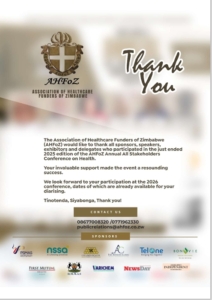Stanbic steps up effort to promote healthcare, Dailynews, 17 April 2025
https://dailynews.co.zw/stanbic-steps-up-efforts-to-promote-healthcare/
https://dailynews.co.zw/stanbic-steps-up-efforts-to-promote-healthcare/
https://healthtimes.co.zw/2025/04/16/psh-adopts-social-enterprise-model-to-sustain-health-services/
https://www.newsday.co.zw/health/article/200040828/38-measles-cases-reported-in-zim
https://www.herald.co.zw/africa-wins-when-womens-health-is-prioritised/
https://www.herald.co.zw/zim-assumes-sadc-military-health-services-working-group-chairmanship/
https://www.chronicle.co.zw/peri-urban-elderly-struggle-to-access-healthcare/
https://www.herald.co.zw/health-sector-brings-vision-2030-within-reach/
https://dailynews.co.zw/cholera-outbreak-decisive-action-critical/
https://www.sundaymail.co.zw/govt-taps-sin-taxes-to-plug-funding-gaps-in-health
18 Southey Road, Hillside, Harare, Zimbabwe

